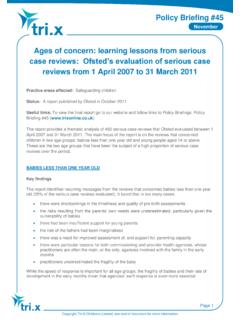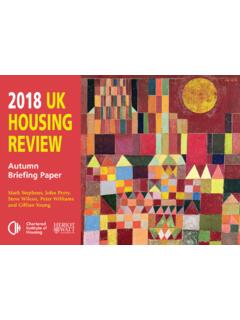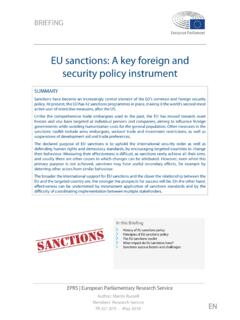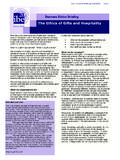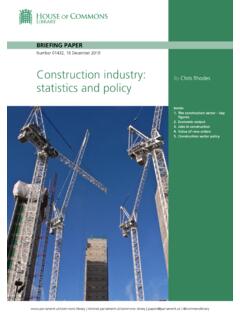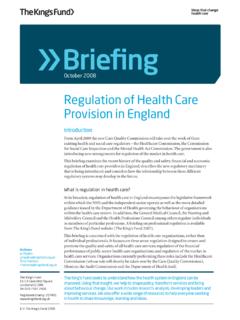Transcription of Five Recent Serious Case Reviews - tri.x
1 Copyright Tri-X -Childcare Limited, see end of document for more information five Recent Serious case Reviews Summary During September five Serious case Reviews (SCRs) were published which attracted considerable media attention. These were amongst the first SCRs to be published in full on high profile cases. The cases were Daniel Pelka (Coventry), Keanu Williams (Birmingham), Child T (Haringey), Child D (Portsmouth) and Maisie Harrison (Northamptonshire). Daniel Pelka and Keanu Williams were murdered by their carers, Child T concerned repeated Serious injury to the child, Child D and Maisie Harrison were Sudden Unexplained Death in Infancy (SUDI) with co-sleeping a contributory factor in a context of neglect.
2 While each case has unique features the accounts given by the SCRs have much in common with each other and with the conclusions of the overview studies of SCRs by Marion Brandon et al (New learning from Serious case Reviews : a two year report for 2009-2011. Brandon et al Research Report DFE-RR226). In each case there were weaknesses in: Social work assessments; Multi agency assessments such as prebirth assessments; The child s view and the child s experience were not central to the practice or consideration of the case ; Rules of optimism and tendency to start again with each incident or new engagement with the family applied; Key information was not shared across the professional network involved with the child and family; No one had a full picture of all the circumstances of the child and their family.
3 Domestic violence, drugs or alcohol misuse or psychological problems were features of these cases; and In nearly all cases there was evidence of resource and organisational, capacity and capability problems in key social care, police and NHS agencies. The overview reports make a number of recommendations to address the issues in each case and the individual management Reviews make numerous recommendations for their agencies. The SCRs recognise and reference previous SCRs which have made similar findings and the Reviews of SCRs by Marion Brandon et al. In that sense there is little new in these SCRs in terms of practice recommendations or policy developments.
4 They reinforce the centrality of good individual and collective safeguarding and child protection practice and that this needs to be good across all the agencies. 99 #75 Policy Briefing November 2013 . Copyright Tri-X -Childcare Limited, see end of document for more information It is very evident from these cases how weaknesses in one agency need to be picked up by other agencies and practitioners and challenged. Where there are weaknesses across the safeguarding system then failure to identify and accurately assess risk of harm to children is significantly increased.
5 The SCRs deal to varying degrees with wider why questions including why findings are repeated from previous SCRs. They all in some degree give information on the local context for the agencies involved. The critical factors arising across a number of agencies, other than those mentioned above, appear to have been: Inexperienced staff and staff lacking the competence and confidence to deal with very complex family situations; Management instability and lack of effective management oversight; Difficulties in keeping track of families moving around frequently ; the need for consistency of professional contact; Loss of investigative thrust where there had been injuries and the medical opinion of their cause was uncertain.
6 In some local authorities and community health services, Serious staffing issues leading to staff shortages, frequent changes of worker and use of agency staff; Peripheral role of GPs and the weak links between GPs and social workers and in some cases health visitors; Lack of clarity about what the plan is for the child and family and consequently what success will look like; Lack of challenge between and within agencies; Staff taking a narrow view of their responsibilities and not taking a wider view of their role and whether they needed to share information or act on information which they had; Lack of challenge and scepticism about what the adults say about events and their behaviour domestic violence, drug and alcohol consumption; Lack of consideration of history on a single or multi-agency basis leading to an overoptimistic view of the child s circumstances.
7 Finally these SCRs bring into sharp focus the role of Local Safeguarding Children Boards and their function. This has led a number of the LSCBs involved to reflect on their effectiveness and impact given these Reviews show evidence that in spite of much activity at Board level there remain Serious weaknesses in practice across the local interagency safeguarding systems. Daniel Pelka Coventry The full overview report is available at: Daniel died in March 2012 aged 4 years and 8 months. He died from a blow to the head but had suffered months of Serious neglect and abuse prior to his death.
8 He had been systematically deprived of food, fed salt, locked in a room and physically abused.. Copyright Tri-X -Childcare Limited, see end of document for more information He had numerous injuries at the time of death as well as the head injury which was the cause of death. Daniel s mother and her partner were convicted of his murder. Daniel had an older and younger sibling. The family were Polish. The SCR identified three key points were intervention could have made a difference. These were: When Daniel had a broken arm in January 2011 the medical assessment was inconclusive but there were concerning features to the injury and its presentation.
9 The recommendation was for a core assessment. This was undertaken but did not focus on the injury and its background and the long history of domestic violence. The assessment did not lead to any intervention with the family; Daniel s presentation in school, which Daniel started in September 2011, as always hungry. Daniel was observed scavenging for food and was stealing other children s food. His mother said he had health problems and the school sought help from the family GP and the school nurse referred Daniel to the community paediatrician. In addition school staff noticed a number of injuries to Daniel on his head and neck which were not explained.
10 These were not linked to the eating problems and did not lead to any onward referral or other intervention; An appointment with a community paediatrician in February 2012. This examination linked his low weight and eating problems to a likely medical condition and did not consider emotional abuse and neglect as a possible cause of Daniel s weight loss. A feature of this case which is absent from the other four cases is the extent to which Daniel s mother and her partner deliberately set out to deceive those professionals they had contact with. This was evident in the history they gave at the paediatric appointment and to the school in respect of Daniel s eating problems.



